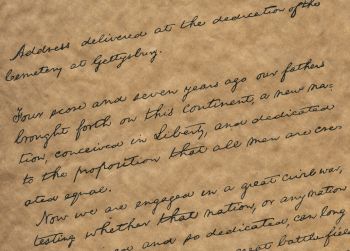Traditions and human ideas have complicated the true simplicity of following Jesus Christ. There can be real power in the simple.
One of the most famous and deadliest battles of the American Civil War took place just outside Gettysburg, Pennsylvania, in the summer of 1863.
Because of the magnitude of this battle, the ground on which it occurred was dedicated as a memorial on Nov. 19, 1863. One of the most famous orators in American history, Edward Everett, was the featured speaker. President Abraham Lincoln was scheduled to speak after him. Everett spoke for two hours, and the audience was spellbound. According to the reporters in attendance, 15,000 people stood motionless, hanging on every word.
Everett’s rehearsal of American history was, according to the reporters, nothing short of brilliant.
Lincoln’s short and simple speech
Then it was President Lincoln’s turn to speak. He told everyone that his message would be simple and short. And indeed it was! He spoke for less than two minutes (a total of 272 words), unheard of at the time, and a length some felt unbecoming of the president. The immediate reviews were not flattering to the president, while Everett was praised by all.
Everett wrote later that little did Lincoln know that what he said would have such an impact on the nation. Abraham Lincoln chose to emphasize the principle that “all men are created equal.” This was the moral argument against slavery. He did not use big words. He chose not to give a long list of adjectives, which was common for an orator of the day.
In the years since that November date, Lincoln’s Gettysburg Address has endured as arguably the most quoted and most memorized speech in American history.
Monumental in its simplicity

Lincoln’s speech was monumental in its simplicity. In a few words Lincoln addressed the major moral issue of his day. His answer to slavery was simple—if all men are created equal, then slavery is wrong.
In our complicated world today, it seems there is no such thing as a simple answer to any problem. Everything must be couched as “just my opinion,” rather than providing a clear definition of right and wrong.
Christian complications
Proponents of traditional Christianity are not immune to political correctness and situation ethics when it comes to some of the issues facing our world today. They constantly miss the mark by abandoning a clear definition of right and wrong. You can claim the title of Christian as a Baptist, a Methodist, a Catholic or any one of thousands of groups and hold completely opposite views of wrongdoing. You can be a conservative or a liberal Christian.
Was the message of Christ that confusing and that complicated?
The simplicity that is in Christ
The apostle Paul stated in his second letter to the Corinthians, “But I fear, lest somehow, as the serpent deceived Eve by his craftiness, so your minds may be corrupted from the simplicity that is in Christ” (2 Corinthians 11:3). The danger that Paul warned about was the complicating of a message that should really be simple.
Simple is defined as easy to understand, deal with and use; not elaborate or artificial, plain; not complicated, complex or compound. Paul referred to the simplicity of Christ. It doesn’t require a course in theology to understand the message Christ brought or the core values that define right from wrong.
Just 10 Commandments
True Christianity has a basic code of law for defining behavior.
True Christianity has a basic code of law for defining behavior. While many today want to diminish or even remove aspects of this law, it endures as the foundation for all biblical law. It is referred to as the 10 Commandments and is found in Exodus 20 and Deuteronomy 5. Compare the simplicity of the 10 Commandments to the complicated legal systems that exist in most countries today.
While there are only 10 Commandments in the basic biblical list, how many laws do you think there are in the U.S.—both federal and state? The honest answer is that no one knows.
In 1982 the U.S. Justice Department set about to do an actual count of all the federal laws. Most federal laws are found in two publications: Statutes at Large and the United States Code. Both are multiple-volume works. Ronald Gainer, a Justice Department official, was put in charge of this effort. The project lasted two years and eventually compiled a list of 3,000 offenses spread over 23,000 pages of federal law.
However, Mr. Gainer announced afterward that “you will have died and [been] resurrected three times,” and still not have an answer to this question of how many laws there are (Wall Street Journal, July 23, 2011). Today, that total is estimated to be “at least 5,000 federal criminal laws, with 10,000-300,000 regulations that can be enforced criminally.”
Taxing
In addition to the 10 Commandments, which define behavior, are there additional laws defining other aspects of our lives as Christians? Compare God’s law of tithing to the complicated tax codes of our modern nations. The U.S. tax code consisted of 400 pages in 1913. In 2014 the total was 74,608 pages.
The law of tithing, on the other hand, is simple—10 percent of your increase.
Christ’s message and example
The message that Christ brought was also quite simple. Mark 1:15 describes the beginning of His ministry. He proclaimed the gospel (good news) of the Kingdom of God. The message was about the Kingdom of God and did not focus wholly on His first coming as Savior. He would come again as King of Kings to establish the Kingdom of God. He preached about the coming Kingdom of God and the need for everyone to repent, or change.
True Christianity, as defined by the Bible, is simple.
It’s a pretty simple message, but it has been complicated today by omitting the good news about the Kingdom, and instead focusing exclusively on the person of Jesus Christ. Is that the real message that Christ taught? The Scriptures tell us otherwise.
True Christianity, as defined in the Bible, is simple. A Christian isn’t someone who has a title—Baptist, Methodist, Catholic. A Christian is someone who is a true follower of Jesus Christ, who believes what He taught and strives to walk in His footsteps (1 Peter 2:21). Some would be amazed to learn that Jesus Christ was a Sabbath-keeper and kept the annual festivals of the Bible (Luke 4:16; Mark 14:1). Many consider these days to be Jewish, but the Bible makes it clear that these days actually belong to God (Leviticus 23:1-2).
One of the most powerful messages found in Scripture was given by Peter on the Day of Pentecost. His conclusion was simple—repent and be baptized, and you shall receive the gift of the Holy Spirit (Acts 2:38). Since the Garden of Eden, Satan has been complicating God’s message, so we should not be surprised that religion today has no real answers for the social and moral problems that plague this world.
Absolute good and evil
The Bible confirms the existence of absolutes. In Malachi 3:6 God says, “I do not change.” In the book of Hebrews we read that Jesus Christ is the same yesterday, today and forever (Hebrews 13:8). And Christ Himself said, “Your word is truth” (John 17:17). The standard for Christian conduct should be the same today as it was in the first century.
In the Garden of Eden Satan lied to Eve and deceived her into partaking of the tree of the knowledge of good and evil. Rather than trusting God to provide the knowledge of what is good and what is evil, man took that to himself. So today we have thousands of groups with differing ideas about truth, all claiming to be Christian. How can that be? How did the truth get so complicated?

Christianity, based on Scripture, isn’t all that complicated. When we follow the instructions to keep God’s law, which includes worshipping on the seventh-day Sabbath, observing the annual festivals and paying a tithe equal to 10 percent of our increase, we confirm the simplicity of Christianity. It requires that we commit to acting like Jesus Christ—which means obedience to God, love for mankind and commitment to a style of living as outlined in God’s Word.
Looking for the church behind Life, Hope & Truth? See our “Who We Are” page.
The power of simple
Abraham Lincoln was not the greatest orator at the dedication of the Gettysburg battlefield in 1863. One of America’s greatest orators, Edward Everett, was held in awe for his meandering two-hour message about American history on that November day.
But Abraham Lincoln was committed to giving a simple summary of the moral issue faced by the nation. He spoke for less than 2 minutes. His speech is remembered today, but no one remembers what Edward Everett had to say.
True Christianity, as defined by the Bible, is simple. Follow in the footsteps of Jesus Christ. Believe what He believed. Teach what He taught.
Simple!





